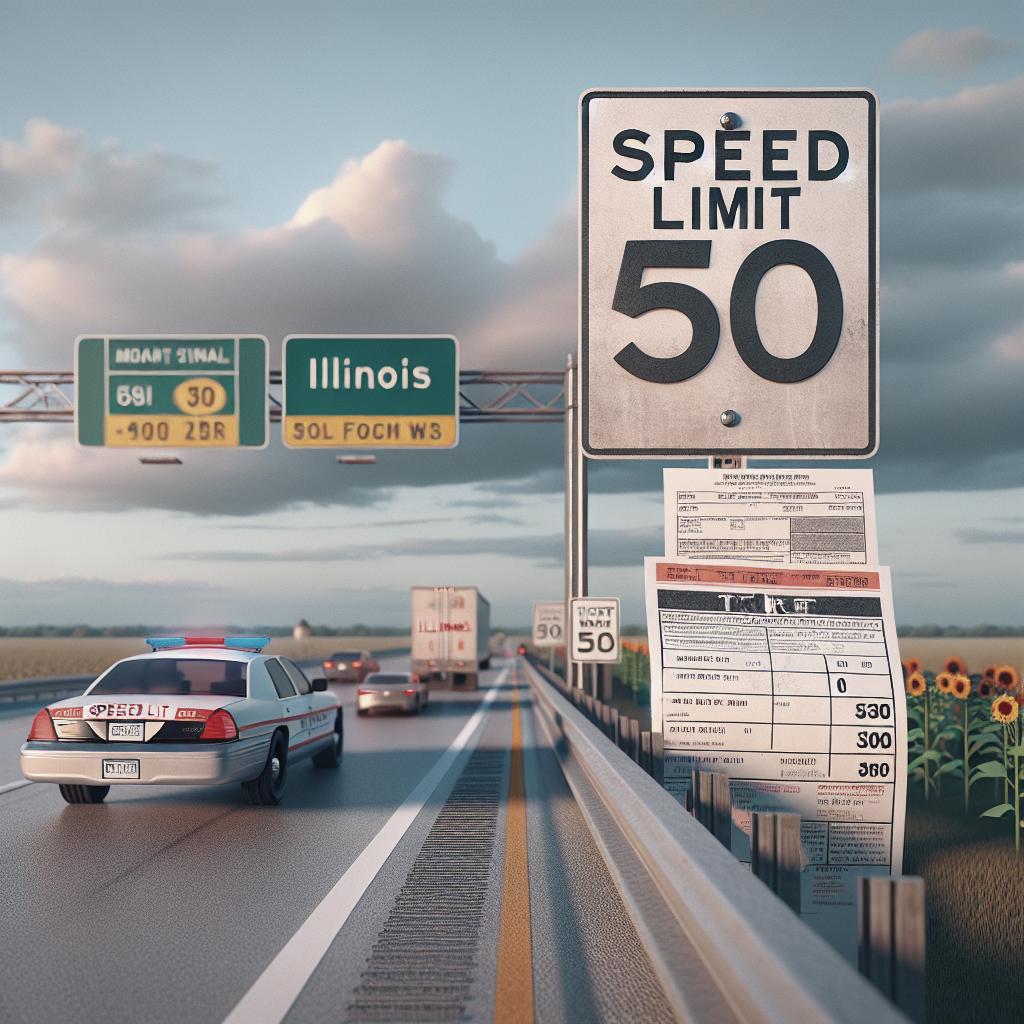html
How Much is a Speeding Ticket in Illinois
Speeding tickets are a common penalty for drivers in Illinois. Understanding the basic speeding laws and penalties is crucial for Illinois residents and travelers. This article explores the intricacies of Illinois’s speeding laws, absolute speed limits, and the potential financial penalties associated with speed violations. Additionally, it delves into how a speeding ticket can impact your driving record, the procedures of traffic courts, and the role of legal representation. By assembling this detailed guide, we aim to provide readers with a comprehensive understanding of speeding penalties and encourage safer driving habits.
Basic Speeding Law and Absolute Speed Limits
Illinois enforces both basic speed laws and absolute speed limits to ensure road safety. Under the basic speed law, drivers must operate their vehicles at speeds that are reasonable and proper for current road conditions. This means that even if you are driving under the posted speed limit, you could still receive a ticket if conditions (like weather or traffic) necessitate slower driving. The purpose of this law is to maintain safety across various driving scenarios, adapting to the momentary context rather than adhering to fixed numbers.
Absolute speed limits, on the other hand, provide a clear, quantifiable metric for legal speeds. In Illinois, these limits are typically 30 mph in urban areas, 45 mph in suburban areas without posted signs, and 55-65 mph on highways and interstates. These limits are strictly enforced, and exceeding them constitutes a violation. Understanding these limits and their implications is vital for drivers to avoid fines and legal consequences.
Penalties for Speeding Violations
Penalties for speeding in Illinois vary based on the severity of the violation. Minor violations, typically those that involve exceeding the speed limit by 1-10 mph, can result in fines ranging from $75 to $150. More serious offenses come with higher fines, particularly if the speed exceeds the limit by over 20 mph, where drivers may face fines upwards of $300. Additionally, excessive speeds, particularly those classified as driving more than 40 mph over the limit, could lead to misdemeanor charges, which carry heavier fines and potential jail time.
Additional costs associated with speeding tickets include court fees, which can add significant amounts to the overall cost of a ticket. Furthermore, repeat offenses can lead to escalated fines and potential suspension of driving privileges. It’s crucial for Illinois drivers to understand these penalties not only for the immediate financial impact but also for the long-term consequences on their driving status.
The Impact of Speeding on Your Driving Record
Receiving a speeding ticket in Illinois can significantly affect your driving record. Each ticket accumulates points on your record, which can increase your auto insurance rates. The Illinois driving record point system assigns varying points depending on the severity of the violation, with minor infractions adding fewer points and significant speed violations capable of adding more detrimental points. These points can impact insurance premiums for several years.
Multiple infractions within a short timeframe could lead to the suspension or revocation of driving privileges. The implications of this are far-reaching, affecting daily life and possibly leading to increased auto insurance rates. Understanding how speeding impacts your driving record underscores the importance of adhering to speed limits and driving carefully to maintain a clean record.
Understanding Traffic Courts in Illinois
When contesting a speeding ticket in Illinois, it often involves appearing in traffic court. The traffic court process begins when a citation is issued. Drivers can either pay the fine, admitting guilt, or contest the citation in court. If you choose to dispute the ticket, a court date is scheduled where evidence from both sides is presented before a judge who delivers a resolution.
Traffic courts operate under procedures similar to criminal courts but are generally less formal. However, the presence of legal representation can impact the outcome positively. It’s important to gather all relevant information and evidence to support your defense. Understanding the traffic court process can provide better preparedness should you decide to contest a violation.
Legal Representation for Speeding Violations
While not always necessary, securing legal representation when dealing with speeding violations in Illinois can be advantageous, especially for serious offenses. A legal expert can navigate the complexities of traffic law, presenting defenses that a layperson might overlook. They can negotiate with prosecutors, potentially reducing charges or the associated penalties.
Hiring a lawyer becomes particularly beneficial if the speeding charge is accompanied by other serious offenses, such as reckless driving or if the accused has a history of traffic violations. Although it represents an additional cost, effective legal representation can mitigate severe punitive outcomes, making it a consideration worth investigating for individuals facing significant charges.
Future Prospects
Understanding the implications of speeding tickets in Illinois—from the laws that define them to the penalties and potential court proceedings—not only empowers drivers but emphasizes the importance of adhering to traffic rules. With legal and financial stakes quite high, informed driving can prevent penalties and ensure public safety on the roads. By maintaining awareness and possibly seeking legal guidance when necessary, drivers can minimize risks and contribute to safer driving environments.
| Aspect | Details |
|---|---|
| Basic Speeding Law | Drive at reasonable speeds suitable for current conditions. |
| Absolute Speed Limits | Strict limits depending on area: Urban <30mph, Highways 55-65mph. |
| Penalties | Fines from $75 (minor) to over $300 (severe); possible misdemeanors. |
| Impact on Driving Record | Points added per violation, affecting insurance rates. |
| Traffic Courts | Option to contest; process involves court appearance and hearing. |
| Legal Representation | Advised for serious offenses; can mitigate charges. |


